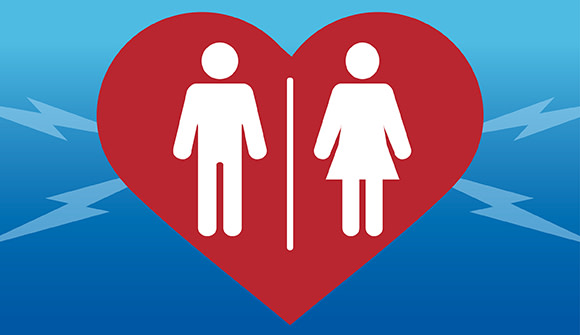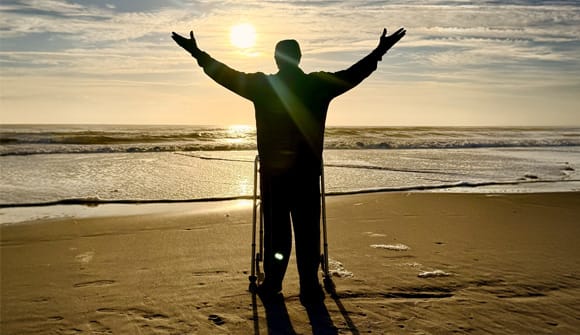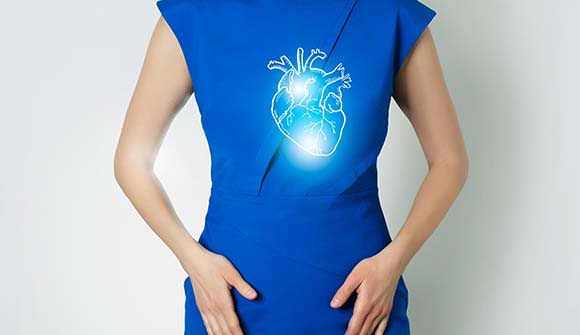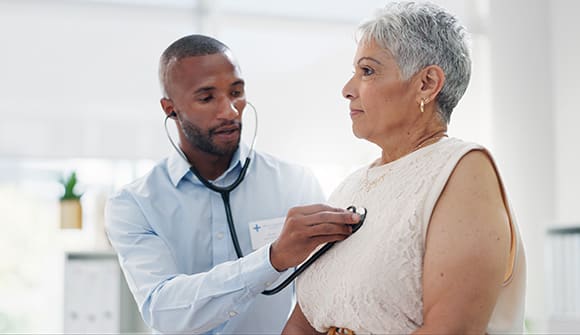Getting her rhythm back
Smartwatch speeds up Afib diagnosis.
Article Date:

Eight weeks. That’s how long it took Marsha Powers to get her rhythm back – her heart rhythm, that is. She went to see her primary care doctor in mid-May and by early July, she had undergone a procedure to treat the heart rhythm disorder atrial fibrillation (Afib) at the new Heart Rhythm Center at Baptist Medical Center Jacksonville.
“Previously, it would have taken anywhere from eight to 24 months before she would have had her procedure,” said Matthew McKillop, MD, a clinical cardiac electrophysiologist with Baptist Heart Specialists and medical director of Baptist Health’s Electrophysiology program.
So, how did eight months become eight weeks? It’s thanks to Powers self-identifying her Afib via her smartwatch and sharing the readings with her primary care doctor, Nicholas Peterkin, MD, who made a fast referral to Dr. McKillop.
Dr. McKillop has spread the word among Baptist Health’s network of primary care doctors to send patients with Afib directly to the Heart Rhythm Center.
Saving much-needed time
“This smartwatch technology has compressed the diagnosis-to-treatment timeline into a few weeks as opposed to months,” said Dr. McKillop. And there is considerable health value wrapped up in that time savings. “Limiting the amount of Afib a heart is exposed to results in a more favorable outcome for the patient,” he added.
The seamlessness of the process and continuity from primary care physician to heart rhythm specialist didn’t go unnoticed by Powers.
“Health care systems can be very frustrating and intimidating,” said the former health care executive who spent 45 years in the industry before her retirement. “And so, to have a seamless, systematic approach to a patient's care is phenomenal.”
Powers opted to have an ablation, a minimally invasive procedure to freeze the heart tissue that triggers the irregular beat. Dr. McKillop performed the procedure at the new Heart Rhythm Center, which he described as a “regional, if not national, leader in electrophysiology care in terms of state-of-the-art technology and structure.”
Part of what makes it unique is that pre- and post-operative recovery is consolidated into one location with its own dedicated team.
“It allows us to focus on these patients and their needs, which are different than those of other heart patients,” Dr. McKillop said.
The day after her surgery, Powers was celebrating the Fourth of July at the beach with her family. Aside from not lifting anything heavy for 10 days, she was able to resume her normal activities immediately, including her daily four-to-five-mile walks.
“The Heart Rhythm Center was everything Dr. McKillop said it would be,” she said. “Every single person I interacted with was great, from the people at the front desk to the nurses. The center is helping to improve the quality of living in our community.”
Self-monitoring enables empowerment
Afib never goes away entirely. It’s a condition that will always need to be managed and smartwatches are proving to be an invaluable tool in this area. Dr. McKillop stressed that although this technology isn’t always accurate, it’s a good preliminary assessment tool so patients can consult specialists for further testing.
“A lot of my patients who didn’t have smartwatches now do, and they use them to help identify a recurrence of Afib so they can get back into my office for timely intervention,” he said. He also noted that there are several smartwatches and apps available on the market at various price points.
Powers didn’t notice symptoms of Afib, and she’s not alone. Often people don’t connect symptoms like heart palpitations because they can range from slight flutters to feeling like your heart is racing. She encourages everyone to get a smartwatch.
“I think the diagnosis and treatment of heart rhythm disorders is going to be more common because of them.”
The Heart Rhythm Center at Baptist Medical Center Jacksonville is the region’s only dedicated center for the care and treatment of patients with heart rhythm disorders. If you think you may have a heart rhythm disorder, like Afib, call 904.202.AFIB (2342) or visit baptistjax.com/Afib.



